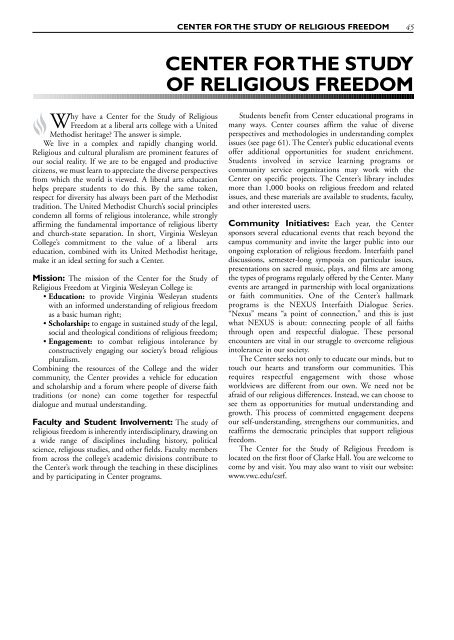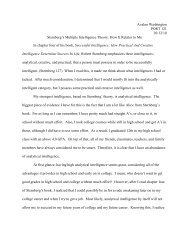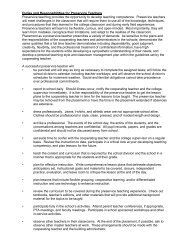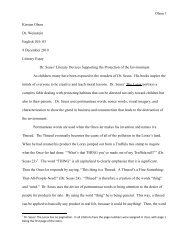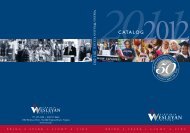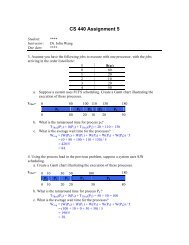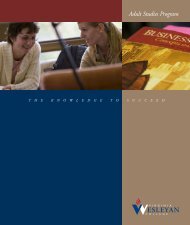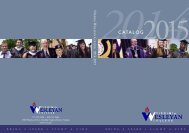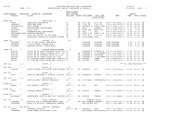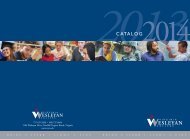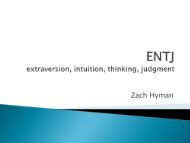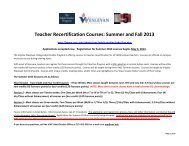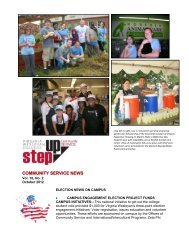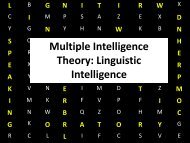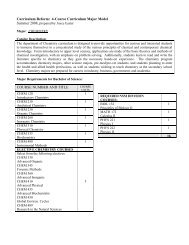44 CENTER FOR SACRED MUSICThe Center for Sacred Music at <strong>Virginia</strong> <strong>Wesleyan</strong><strong>College</strong> educates students for careers in churchmusic ministry, and offers opportunities for allstudents to broaden their awareness of the music and ritualthat have been part of humankind’s various faithexpressions since the world began.Church Music Certificate Program: The ChurchMusic Certificate at <strong>Virginia</strong> <strong>Wesleyan</strong> offers practical andtheoretical knowledge for Church Music Ministry careerpreparation. The course of study includes academic courses,symposia attendance, critical observations of area churchmusic programs, and participation in the <strong>College</strong>’s annualSacred Music Summer Conference. It has been recognizedby the <strong>College</strong> Board for its excellence in training churchmusicians in the liberal arts setting.Three semester-length courses are offered: Sacred MusicHistory, Directing Church Choirs, and Hymnology andChoral Literature (offered as MUS 310: Topics in SacredMusic) and are requirements for the certificate program,but may also be taken as a supplement to other curricula,and provide a theoretical basis of study.Sacred Music-of-the-World SymposiumSeries: The Center offers an annual symposium series tofoster understanding, and to encourage an appreciation fordiversity in the sacred music and ritual of various faithcommunities. Offered during the campus co-curricularhour on occasional Tuesdays and Thursdays throughout theacademic year, programs are designed to appeal to studentsin all disciplines.Past topics have included “Sacred Sounds: CulturalUnity and Diversity,” a four-part series; “Then Sings MySoul” on the four streams of American ProtestantHymnody; “Let All the World in Every Corner Sing,” anexamination of “service music” used in various worldreligions; “Here Comes the Bride,” wedding ritual andmusic in various world traditions; and “Sing Me ToHeaven,” an exploration of the music and ceremony used incultures for funerals and services of remembrance.Performance Opportunities: The <strong>Wesleyan</strong> FestivalChorus is a massed choir of students and communitysingers linking choral musicians with the finest conductorsin the world for worship leadership and for concertperformances. Each summer, the chorus presents twoevents as part of the Sacred Music Summer Conference.CENTER FORSACRED MUSICSacred Music Summer Conference: The SacredMusic Summer Conference is a non-denominationalshowcase for outstanding instruction in the sacred arts.Steeped in the Wesley tradition of “training minds andwarming hearts,” the conference offers workshops forstudents preparing for church music ministry careers, thosealready active in the profession, and music teachers.An average of 200 people participate each year,participating in workshop sessions in choral conducting,congregational singing, organ, handbells, children’s choirs,and all areas of church music ministry. The event is led by18 guest faculty and members of the VWC musicdepartment. The evening worship and choral concert choirsprovide an unparalleled experience for those who enjoysinging under the direction of world-renowned conductors.The <strong>Virginia</strong> <strong>Wesleyan</strong> <strong>College</strong> AnthemSeries: In <strong>2008</strong>, the Center for Sacred Music developed achoral anthem series with MorningStar Music Publishers ofSt. Louis, Missouri, entitled “Music from American<strong>College</strong>s and Universities.” VWC holds the honor of thepremiere work in that series; an anthem commissionedfrom Texan composer Hal Hopson in celebration of the300th anniversary of the birth of Charles Wesley in 2007.This contribution to American music continues thecollege’s legacy, joining the VWC Choral Anthem Series theCenter developed in 1998 with Hinshaw Music Publishersof Chapel Hill, North Carolina. Now in its tenth year, thatseries includes 11 choral anthems. An additional fouranthems that have been dedicated to the work of the Centerare published by Choristers Guild Publishing, AugsburgPress, and Hal Leonard Music Publishers. Through itsvarious festivals and conferences, the Center commissionsnew music which is premiered at VWC, then madeavailable to the world. Anthems from this catalog ofpublications are used by church and school chorusesthroughout the country, and several have been selected forDistrict Chorus and All-State repertoire selections. VWCjoins Duke University and St. Olaf <strong>College</strong> as only the thirdinstitution of higher education with a named music series.The Wesley Seminary Connection: VWC’sCenter for Sacred Music collaborates with WesleyTheological Seminary to offer a graduate level ChurchMusic Certificate. Offered as part of the Seminary’s“Equipping Lay Ministry Certificate Program,” studentsmay register through Wesley for classes held at <strong>Virginia</strong><strong>Wesleyan</strong> or at the Seminary’s Washington, D.C. campus.The Center’s Sacred Music Summer Conference fulfills oneof the course requirements for this certificate.
CENTER FOR THE STUDY OF RELIGIOUS FREEDOM45CENTER FOR THE STUDYOF RELIGIOUS FREEDOMWhy have a Center for the Study of ReligiousFreedom at a liberal arts college with a UnitedMethodist heritage? The answer is simple.We live in a complex and rapidly changing world.Religious and cultural pluralism are prominent features ofour social reality. If we are to be engaged and productivecitizens, we must learn to appreciate the diverse perspectivesfrom which the world is viewed. A liberal arts educationhelps prepare students to do this. By the same token,respect for diversity has always been part of the Methodisttradition. The United Methodist Church’s social principlescondemn all forms of religious intolerance, while stronglyaffirming the fundamental importance of religious libertyand church-state separation. In short, <strong>Virginia</strong> <strong>Wesleyan</strong><strong>College</strong>’s commitment to the value of a liberal artseducation, combined with its United Methodist heritage,make it an ideal setting for such a Center.Mission: The mission of the Center for the Study ofReligious Freedom at <strong>Virginia</strong> <strong>Wesleyan</strong> <strong>College</strong> is:• Education: to provide <strong>Virginia</strong> <strong>Wesleyan</strong> studentswith an informed understanding of religious freedomas a basic human right;• Scholarship: to engage in sustained study of the legal,social and theological conditions of religious freedom;• Engagement: to combat religious intolerance byconstructively engaging our society’s broad religiouspluralism.Combining the resources of the <strong>College</strong> and the widercommunity, the Center provides a vehicle for educationand scholarship and a forum where people of diverse faithtraditions (or none) can come together for respectfuldialogue and mutual understanding.Faculty and Student Involvement: The study ofreligious freedom is inherently interdisciplinary, drawing ona wide range of disciplines including history, politicalscience, religious studies, and other fields. Faculty membersfrom across the college’s academic divisions contribute tothe Center’s work through the teaching in these disciplinesand by participating in Center programs.Students benefit from Center educational programs inmany ways. Center courses affirm the value of diverseperspectives and methodologies in understanding complexissues (see page 61). The Center’s public educational eventsoffer additional opportunities for student enrichment.Students involved in service learning programs orcommunity service organizations may work with theCenter on specific projects. The Center’s library includesmore than 1,000 books on religious freedom and relatedissues, and these materials are available to students, faculty,and other interested users.Community Initiatives: Each year, the Centersponsors several educational events that reach beyond thecampus community and invite the larger public into ourongoing exploration of religious freedom. Interfaith paneldiscussions, semester-long symposia on particular issues,presentations on sacred music, plays, and films are amongthe types of programs regularly offered by the Center. Manyevents are arranged in partnership with local organizationsor faith communities. One of the Center’s hallmarkprograms is the NEXUS Interfaith Dialogue Series.“Nexus” means “a point of connection,” and this is justwhat NEXUS is about: connecting people of all faithsthrough open and respectful dialogue. These personalencounters are vital in our struggle to overcome religiousintolerance in our society.The Center seeks not only to educate our minds, but totouch our hearts and transform our communities. Thisrequires respectful engagement with those whoseworldviews are different from our own. We need not beafraid of our religious differences. Instead, we can choose tosee them as opportunities for mutual understanding andgrowth. This process of committed engagement deepensour self-understanding, strengthens our communities, andreaffirms the democratic principles that support religiousfreedom.The Center for the Study of Religious Freedom islocated on the first floor of Clarke Hall. You are welcome tocome by and visit. You may also want to visit our website:www.vwc.edu/csrf.


